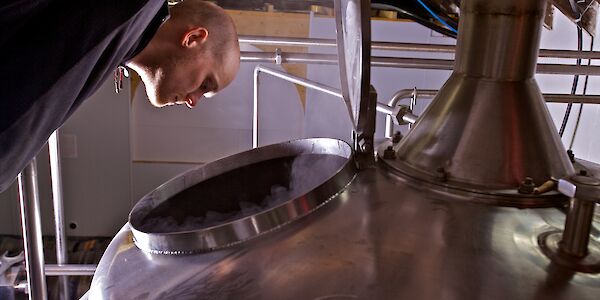Orkney is a vibrant, energetic and forward-looking community, punching well above its weight in the world.
The islands are a relatively prosperous part of Scotland and do well on many economic measures, with low unemployment and high levels of household income. We also have rich natural resources and are at the heart of the country’s move towards a greener economy.
But there are challenges too, many reflecting our unique location and issues surrounding transport connections and population changes.
Agriculture, fisheries and aquaculture
The Orkney economy has had a traditional reliance on agriculture and fishing. Even a short drive through the local countryside highlights our farming heritage, with sheep and cattle in green fields across the islands. Our high quality, fertile farmland means that Orkney beef and lamb is much sought after, and the standard of our grassland helps support a large number of dairy herds. North Ronaldsay is also home to a unique breed of seaweed-eating sheep, with the mutton considered a delicacy in restaurants around the world.
The clean, cool seas surrounding Orkney play a vital part in the local economy too. It's estimated fishing and aquaculture support around 90 local businesses – around 5% of the economy in the islands.
The focus here is very much on shellfish, including crab, lobster and scallops, with thousands of tonnes landed annually. Again, the quality of the product is key, with Orcadian shellfish in huge demand globally. Orkney has the second largest share of employment in fishing in Scotland, after Shetland.
The aquaculture industry has really grown over recent years, with new fish farm facilities installed around Orkney, taking advantage of our clean waters and strong tides. Around 20,000 tonnes of farmed salmon are produced in Orkney every year, and the industry continues to create job opportunities, especially in some of our smaller islands.
Oil & Gas
Another mainstay of the Orkney economy over recent decades has been the oil and gas industry. Oil arrived in the islands in the late 1970s when the newly-commissioned Flotta Oil Terminal began receiving ‘black gold’ from fields in the North Sea. At its peak the terminal processed more than 400,000 barrels annually and brought jobs and prosperity to many islanders. Nowadays the throughput is much smaller but the terminal continues to process oil and tanker traffic. Scapa Flow is a hub for ship-to-ship transfers of oil too.
There are plans in place to help mitigate any loss of oil revenue in the future, with proposals for deep water berths - ideal for decommissioning work and support vessel services - being considered.
Other sectors
These industries have been the powerhouse of the Orcadian economy for some time. However, over the last 20 years there has been a growth in a number of emerging sectors, including manufacturing, tourism, food and drink processing and, more recently, renewable energy.
Visitor numbers to Orkney have steadily grown, particularly over the last decade or so thanks to an increased focus on digital marketing and destination management. 2019 saw more than 190,000 visits to the islands, with more than half arriving for the first time.
Visitor numbers continue to recover following the COVID-19 pandemic too. Orkney is also one of the most popular cruise ship destinations in the country, bringing more than a hundred ships to the islands annually, and millions of pounds of harbour revunue to Orkney Islands Council.
The Orkney larder has an excellent international reputation, with some of the finest food and drink to be found anywhere produced right here in the islands. Everything from whisky, beer and gin, to cheese, bread and ice cream is made in Orkney and exported around the world. The sector supports a number of small businesses which collectively make up an important part of the island economy. The products are also central to Orkney’s image, with quality key to the development of our ‘brand’ on a national, and even international, stage.
Our creative community plays an important role in our economy, with talented makers producing top-quality jewellery, knitwear, textiles, pottery, furniture and much more. Producers range from large-scale businesses to cottage industries. Almost all draw inspiration from the island landscape and our rich history, and play a vital role in attracting visitors and commerce too.
Renewable energy
The most recent addition to Orkney’s economy has been renewable energy, with the islands recognised as a centre of skills and innovation for this emerging industry. Orkney has outstanding natural resources for renewable energy and around hundreds of people are employed in the sector here. These have always been islands of innovation, and that reputation continues to grow thanks to the number of wave and tidal devices tested here, the take-up of electric vehicles (the largest per capita in Scotland), and ongoing low carbon projects, including hydrogen developments.
There are other aspects to the Orkney economy that have vital roles to play. Construction employs a high number of people here and offers plenty of opportunities, especially to young people and the self-employed. The public sector works hard to deliver services to support our economy and employs around 30% of workers in the islands.
There’s no doubt that our economy is unique, and the pursuit of quality is a thread running through every aspect of life in Orkney. Excellence really matters here and it's also a great place to do business.











